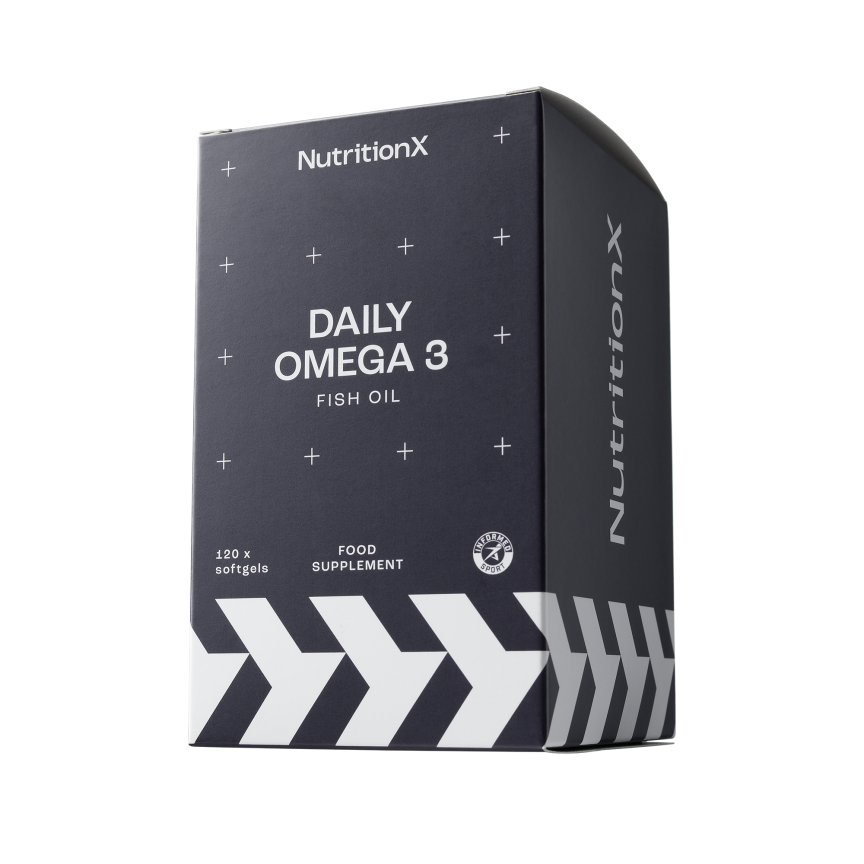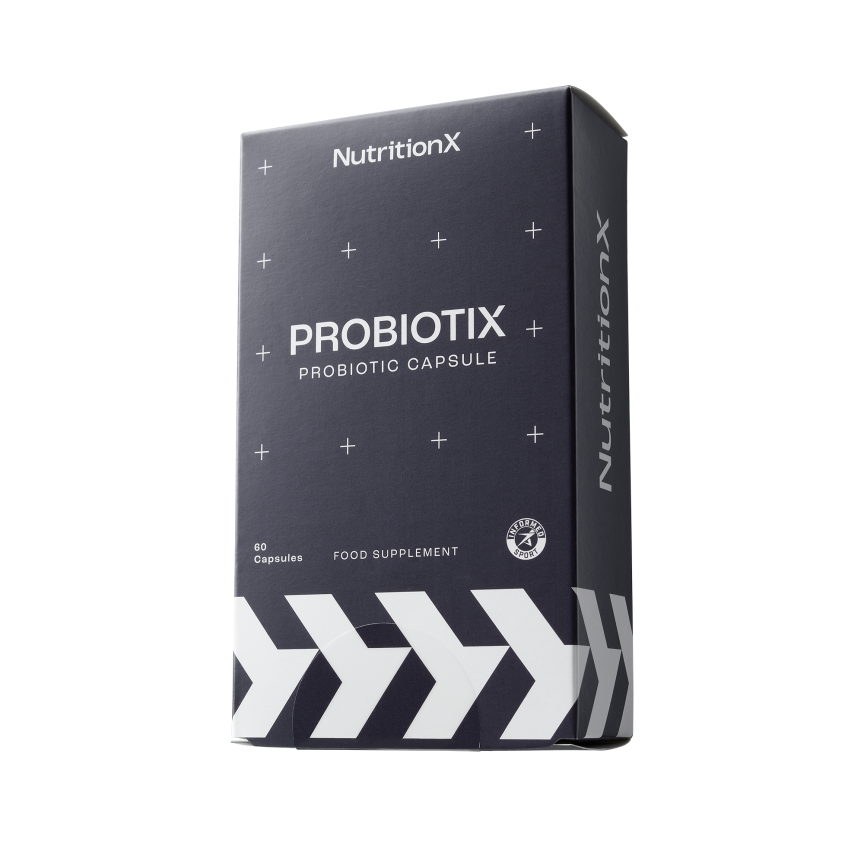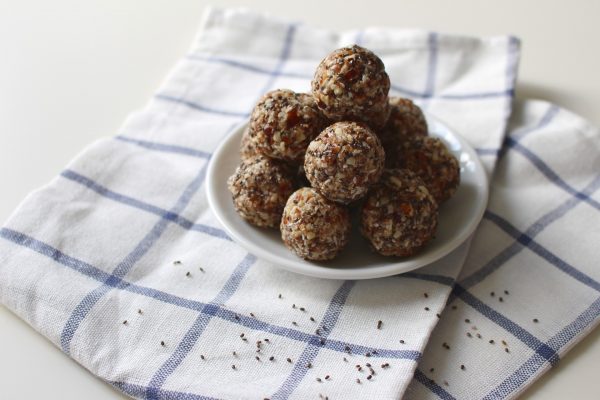Winter Nutrition for Athletes: Why Does it Matter?
Dark evenings and colder temperatures… it’s safe to say that winter is here. The transition in weather is often associated with an increased risk of respiratory tract infections [1] e.g., catching a cold. Combine this with a congested fixture list (usually seen over the Christmas and New Year period) and, if you look after a team, you may find a quick reduction in player availability due to the increased susceptibility to illness [2]. It is therefore important, both as a club and if you’re a player, to make extra considerations over the winter period to help keep you – and your players – on the pitch.
How can the winter months impact performance?
Meeting energy demands is a vital part of performance, with under-fuelling (i.e.. not giving your body the energy it needs through nutrition) increasing the risk running out of energy as you train. This is particularly important during the winter months because not only may it impact performance, but it may also increase your susceptibility to illness. Figure 1 shows the energy intake vs energy expenditure over a typical week in a premier league team. Overall, there was a mean deficit of 400Kcal per week.
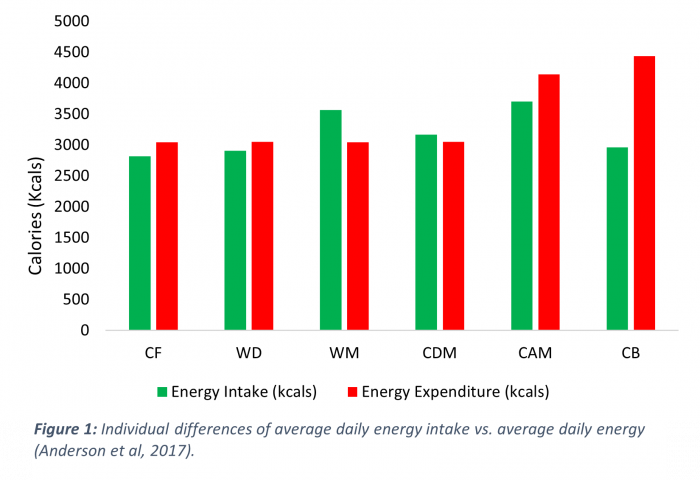
This is particularly important because it could have major implications on player recovery. As shown in figure 2, muscle glycogen significantly reduces over the course of a 90-minute football game. If a player isn’t consuming enough energy, they may start to fatigue quicker. This leads to a domino effect, whereby the player will not be restoring the energy used and so starting the next game with sub-optimal levels of carbohydrate in their system, potentially leading to sub-optimal performance. To maximise recovery, players need to consume plenty of carbohydrates (1.2g/kg per hour) for the 4 hours after the game. The day after the game, the total carbohydrate intake for the day should be 8g/kg body mass or around 360-480g for a 80kg athlete. The appropriate ingestion of carbohydrates can be more complex than you might initially anticipate, for more expert insight into fuelling an athlete read our Carbohydrates – More Than Just a Macronutrient article by Dr. James Morehen.
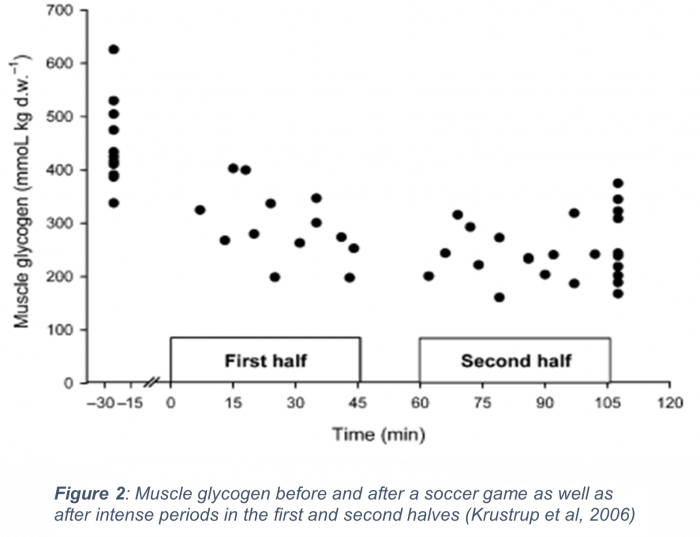
In addition to performance detriments, a player’s health may also decrease due to the mismatch between workload and fuelling. This kind of increased stress can affect the gastrointestinal tract, therefore again increasing susceptibility to illness. At a time when, during the winter months, there is an increased presence of respiratory tract infections yet player availability is important due to match-heavy schedules, maintaining immune health becomes a top priority both for clubs and players themselves.
How to Support Your Immune System in Winter
Consuming a wide variety of fruit and veg will provide the body with micronutrients; vitamins and minerals that are essential for immune health. An easy way to increase micronutrient intake during the winter months, when supporting the immune system is vital, is to ‘eat the rainbow’ by consuming a wide range of coloured fruit and veg (table 1).
Best Food for Your Immune System:
| Table 1: Sources of micronutrients | ||
| Colour | Benefits | Sources |
| Reds | Blood cells & anti-inflammatory | Tomatoes, strawberries, peppers, watermelon, raspberries |
| Greens | Tissue healing, anti-inflammatory, muscle function, blood cells | Spinach, kale, broccoli, asparagus, kiwi |
| Whites | Heart health & muscle function | Turnips, onions, garlic, pears, cauliflower |
| Purples & Blues | Brain health, enhances exercise adaptations | Blueberries, blackberries, purple grapes, plums, aubergine |
| Orange & Yellows | Boosts immune function, reduces muscle-damage | Carrots, sweet potatoes, pumpkins, pineapple, mangoes |
There has been a recent move towards differentiating between immune resistance and immune tolerance. Simply put this is the difference between stopping yourself getting ill (resistance), and helping you to recover faster and display less symptoms if you do get ill (tolerance). Whilst the evidence around nutrition supplements and immune resistance is somewhat mixed, there are a number of supplements that show exciting promise for immune tolerance [3] . If we can lesson the symptoms and speed up recovery this has to be a good thing for athletes. It may therefore be appropriate at this time of year to consider supplementation, for example with Vitamin D (find out more about the benefits of Vitamin D in our What is Vitamin D article). Geographical location can affect UVB exposure during the darker winter months and so many people may not be able to synthesise enough vitamin D naturally e.g., in the UK between October – March. But before taking a supplement, it’s important to consider the possible risk associated with using supplements e.g., anti-doping concerns (check out our supplement safety page for more information: Informed Sport - Nutrition X). There needs to be a clear and concise rationale; figure 3 can help provide some practical guidance.
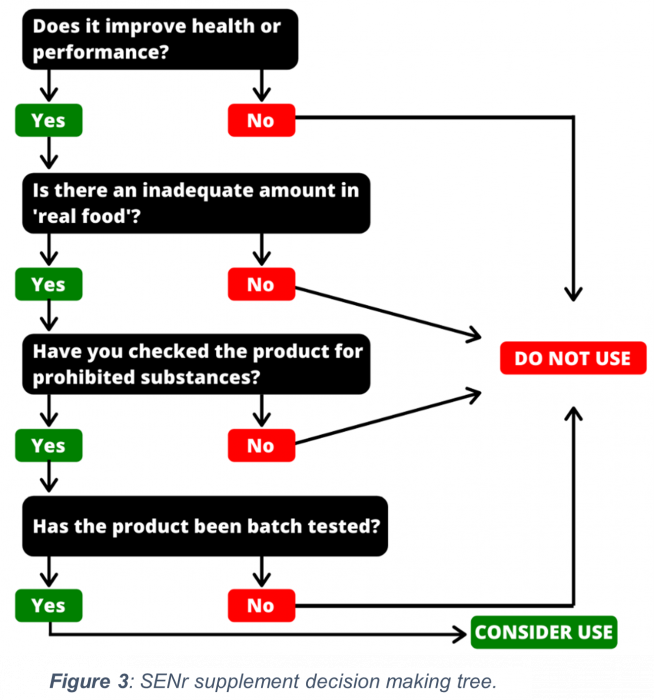
Another product that may be considered for supplementation at this time of year is a probiotic; common winter supplements as they promote friendly bacteria to help your body to fight pathogens, in turn helping to defend against upper respiratory tract infections. In addition to this, there is also evidence that probiotics can help to lessen exercise-induced gastrointestinal discomfort during heavy training periods. We should also consider Vitamin C (500mg day) and Omega 3 (1-3 g per day) as again both of these have been shown to offer benefits when it comes to immune tolerance. Find out more about why we love Omega 3 in our X-Change Article on Omega 3, and the benefits of Vitamin C for athletes in our Athlete’s Guide to Vitamin C.
Supplement recommendations:
- Consider 2,000 IU/day vitamin D3 from October to March to maintain sufficiency
High Strength Daily Vitamin D Tablets | Nutrition X
- Consider probiotics (25 billion CFU live bacteria per day)
Probiotix Probiotic Tablet | Nutrition X
- Consider 500mg/day vitamin C during the winter months, and if you feel the onset of a cold
Chewable Vitamin C Tablets | Nutrition X
- Consider 1-3g of omega every day of throughout the year
Daily Omega 3 Fish Oil Tablets | Nutrition X
Why is sleep important to athletic performance?
An often-overlooked area of performance is sleep. Sleep disruption during the Christmas period may occur due to an increase in midweek and evening games, and it’s not uncommon for games during this time to kick off at 1945 / 2000h. Factor in the use of caffeine (for performance benefits), and it becomes apparent how easy it is to have a disrupted sleeping pattern.
Usually, players have the day after a game off to recover, therefore extending sleep the following day may seem logical. However, having a regular wake time is an essential part of creating good sleeping habits, meaning that sleeping in for too long on recovery days should be avoided. Instead, daytime naps could be implemented to help reach recommended sleep targets (>7h each night). Away from games, having a routine is important. As discussed, having a regular bedtime and wake time is essential, but other factors such as having a cool environment (18 degrees) and avoiding screens (television, mobile phone & computers) can also benefit sleep quality [4].
Key points for optimal winter nutrition:
- Consume >50% daily energy intake as carbohydrate
- Ensure adequate protein intake (1.2−1.6 g/kg body mass per day)
- Eat the rainbow
- Consider supplementation
- Aim for > 7 h sleep each night
References
- Mäkinen, T. M., Juvonen, R., Jokelainen, J., Harju, T. H., Peitso, A., Bloigu, A., ... & Hassi, J. (2009). Cold temperature and low humidity are associated with increased occurrence of respiratory tract infections. Respiratory medicine, 103(3), 456-462.
- Orhant, E., Carling, C., & Cox, A. (2010). A three-year prospective study of illness in professional soccer players. Research in Sports Medicine, 18(3), 199-204.
- Walsh, N. P. (2019). Nutrition and Athlete Immune Health: New Perspectives on an Old Paradigm. Sports Medicine, 51(12), 153-168.
- Walsh, N. P. (2018). Recommendations to maintain immune health in athletes. European journal of sport science, 18(6), 820-831.





